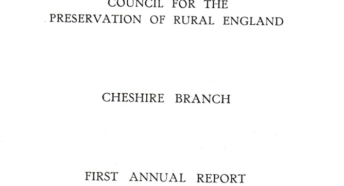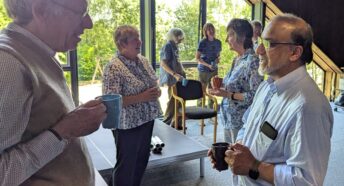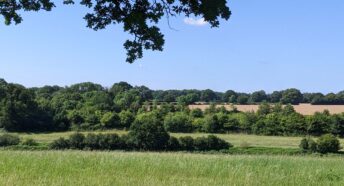Brilliant news! BBC Studios and ITV Studios pull support for Swanscombe theme park

CPRE Kent is one of a coalition of charities to welcome the decision by BBC Studios and ITV Studios to withdraw their support for a proposed theme park in north Kent that would have a devastating impact on a nationally important wildlife site. We are now calling on Paramount Entertainment to similarly publicly sever ties with the developer.
However, despite BBC Studios’ confirmation that its agreement has expired and that London Resort can no longer use the BBC’s Intellectual Property, it appears that London Resort’s exclusive appointed investment partner, Armilla Capital, is still seeking to secure investment by promoting “signed long-term partnerships” with both BBC Studios and ITV Studios to lure investors.
The Swanscombe peninsula, which sits on the bank of the River Thames, is under threat from the proposed London Resort theme park, which would see more than 100 hectares of habitat concreted over.
Until recently, both BBC Studios and ITV Studios intended to pursue commercial relationships with London Resort theme park that would see rides and experiences built on their brands. However, following a letter signed by 12 national and local groups, both have revealed they no longer have agreements with London Resort, while ITV Studios has committed to ceasing all future involvement with the controversial development.
Matt Shardlow, chief executive of Buglife, said: “We welcome ITV Studios’ full recognition of the environmental harm this misplaced theme park would cause and its commitment to have no future involvement.
“It’s great that BBC Studios has also withdrawn from the scheme, although a long-term commitment to never become involved would fit better with the BBC Studios image and environmental sustainability claims. We are disappointed that Paramount has not responded to British wildlife charities’ request to reconsider their involvement but hope it will do so and will join ITV Studios and BBC Studios in halting their support for destroying endangered species. The theme of this wildlife oasis is nature and it must remain so.”
The Swanscombe peninsula is incredibly rich in wildlife, home to some of the UK’s most threatened species of plants and animals. More than 2,000 species of insects and other invertebrates have been recorded here, including the critically endangered distinguished jumping spider.
It is also the richest site in the South East for breeding birds, which live side by side with otters, water voles and rare plants such as man orchid. This is thanks to this special site’s remarkable mosaic of grasslands, coastal habitats, scrub and intricate wetlands, much of which is brownfield habitat that has been reclaimed by nature. In recognition of its valuable wildlife, it was made a Site of Special Scientific Interest (SSSI) last year.
Dr Hilary Newport, CPRE Kent director, said: “This is a fragile and tranquil oasis of dark skies, open space and extraordinary natural biodiversity. It is all the more precious because of its location in one of those parts of the South East subject to the most intense development pressure. In the light of the crisis of the climate emergency and catastrophic loss of biodiversity we simply cannot risk the degradation and loss of this vitally important site.”
The BBC has an international reputation for exemplary wildlife programming, with voices such as Sir David Attenborough’s highlighting the urgent need for action to save our environment to audiences worldwide.
ITV Studios has also gone to great effort to green its productions and instil an environmental culture, while on screen it has broadcast programmes such as A Planet for All of Us, featuring His Royal Highness Prince William. It has both paid attention to its own important messaging and decided to avoid involvement in the destruction of a nationally important wildlife site.
Donna Zimmer, from local campaign group Save Swanscombe Peninsula, said: “BBC Studios and ITV Studios must have been aware how this looked to their millions of viewers and we are really pleased that they have both stepped away from the London Resort – we hope they both now commit to doing so for good.
“For local communities in Swanscombe, Greenhithe and Northfleet, the peninsula is an essential and much-loved green lung, a place for peace and calm to escape the hustle and bustle of everyday life in one of the most built-up and congested parts of the country. It is unthinkable that national broadcasters could have sought to benefit from a scheme that would deprive people of experiencing wildlife on their doorstep.”
Evan Bowen-Jones, chief executive at Kent Wildlife Trust, said: “At a time when society is increasingly concerned about the nature and climate crises, it is becoming commonplace for companies to talk about sustainability. But paper commitments are not enough. Only action counts.
“So we are pleased that ITV has severed all ties with the proposed London Resort. We now want to see the BBC do the same. This flagship British institution must confirm it will never work with a project that would do so much harm to our native wildlife if it is to have any green credibility at all.”
Unfortunately, despite the Swanscombe peninsula being notified as a SSSI in March 2021 by Natural England, the government’s adviser on the natural environment, it remains threatened by the application to build the theme park on it.
These proposals are being considered by the Planning Inspectorate as a Nationally Significant Infrastructure Project (NSIP), a process normally reserved for major roads, airports or power plants. This is the first ‘business or commercial project’ to be considered to date.
- For more on the London Resort scheme, see here
- To read why CPRE Kent views the project as so damaging, click here
Monday, February 28, 2022
- A number of important documents have yet to emerge. For example, a rigorous transport plan and a finalised air-quality assessment. The latter is critical given that allocations at Teynham will feed extra traffic into AQMAs.
- There seems to be no coherent plan for infrastructure delivery – a key component of the plan given the allocations being proposed near the already crowded Junction 7.
- There seems to have been little or no cooperation with neighbouring boroughs or even parish councils within Swale itself.
The removal of a second consultation might have been understandable if this final version of the plan were similar to that being talked about at the beginning of the consultation process. It is, however, radically different in the following ways:
- There has been a major shift in the balance of housing allocations, away from the west of the borough over to the east, especially around the historic town of Faversham. This is a move that raises many concerns.
- A new large allocation, with accompanying A2 bypass, has appeared around Teynham and Lynsted, to which we are objecting.
- Housing allocations in the AONB around Neames Forstal that were judged “unsuitable” by the council’s own officers have now appeared as part of the housing numbers.
- Most of the housing allocations being proposed are on greenfield sites, many of them on Grade 1 agricultural land – a point to which we are strongly objecting.
Concerns about the rush to submit the plan
The haste with which the plan is being prepared is especially worrying given the concentration of housing in Faversham. If the town is to take a large amount of new housing, it is imperative that the policies concerning the area are carefully worked out to preserve, as far as possible, the unique nature of the town. The rush to submit the plan is likely to prove detrimental.
As Swale does not have a five-year land housing supply, it is open to speculative development proposals, many of which would run counter to the ideas contained in the current plan. Some are already appearing. This is a common situation, and one that, doubtless, is a reason behind Swale’s haste.
Our overriding fear, however, is that this emphasis on haste is ultimately going to prove counterproductive. This is because it is our view that the plan, in its current form, is unlikely to pass independent examination. We are urging Swale to listen to and act upon the comments being made about the plan and to return the plan to the council with appropriate modifications before submitting it to the Secretary of State.
Essentially, this means treating the current consultation not as the final one but as the ‘lost’ second consultation.
The consultation ends on Friday 30 April and we strongly urge residents to make their opinions known if they have not already done so.
Further information








